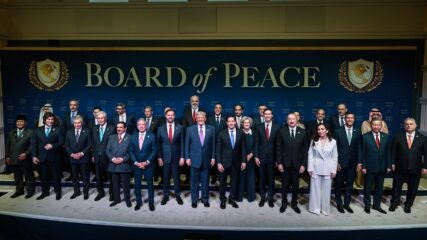May 9, 1942
World War II prevents the convening of a regular Zionist Congress in 1941, so in its place a special gathering opens at the Biltmore Hotel in New York under the auspices of the American Emergency Committee for Zionist Affairs and its chairman, Rabbi Stephen S. Wise. Approximately 600 delegates from 17 countries and Palestine participate in the gathering.
The conference opens with an address by Chaim Weizmann, the president of the Jewish Agency. Weizmann urges the assistance of the great powers — England, Russia and the United States — on the issue of Palestine while asking world Jewry to take action. “Can we, by a joint effort of the will and the intelligence, bring to the notice of the American, the British and the Russian people the decisive elements in our problem and their interplay with the problems of world stabilization? Can we demonstrate a readiness to assume responsibility — with the benevolent sympathy of the world — for the solution of the Jewish postwar problem in a manner which will harmonize with the needs and hopes of the postwar world? Can we, in fact, show that in our desire to answer the cry of a homeless Jewish people, we are actuated by motives which transcend our own pain and fuse with the strivings of humanity? I believe that we can; for I believe that in this tormented and decimated Jewish people, there resides that ancient and elemental will which has carried it across many crises in human history and still demands a creative and not merely a curative outlet.” (“America, England, Russia Hold Key to Jewish Future in Palestine, Weizmann Says,” JTA, May 11, 1942)
After the 1939 London Conference and subsequent White Paper, David Ben-Gurion, the chairman of the Jewish Agency, began to see that the best outcome for the Zionist objective of Jewish self-determination was to build support from the United States government and American Jewry. Ben-Gurion argued that the British drifted from the original intent of the Mandate and for “the unequivocal reaffirmation of the original intention of the Balfour Declaration and the Mandate to re-establish Palestine as a Jewish Commonwealth. … The Palestine Mandate should be entrusted to the Jewish people themselves.” (“Key to Jewish Future in Palestine Held by Allies, States Dr. Weizmann,” in Jewish Advocate, May 15, 1942)
On the third and final day of the Biltmore gathering, the attendees adopt a resolution demanding what Ben-Gurion promoted. “This Conference urges that the gates of Palestine be opened, that the Jewish Agency be vested with control of immigration into Palestine and with the necessary authority for upbuilding the country, including the development of its unoccupied lands, that Palestine be established as a Jewish Commonwealth integrated in the structure of the new democratic world.”
The declaration contains eight points which will become the basis of Zionist policy in the years during and after the war:
- A reaffirmation of American Zionists for “democratic freedom and international justice.”
- A message of “hope and encouragement” to the Jews of Europe.
- Greetings and admiration for the Jews of the Yishuv for “their steadfastness and achievements in the face of peril and great difficulties.”
- An appreciation for the achievements made in Palestine by the Jewish people, who “have made the waste places to bear fruit and the desert to blossom.”
- A reaffirmation of the “readiness and desire of the Jewish people for full cooperation with their Arab neighbors.”
- A call for the “fulfillment of the original purpose of the Balfour Declaration” and a rejection of the 1939 White Paper, which is “cruel and indefensible in its denial of sanctuary to Jews fleeing from Nazi persecution.”
- A call for a Jewish military force in Palestine.
- A declaration that a new world order following victory in the war cannot be complete unless “the problem of Jewish homelessness is finally solved.”
Ben-Gurion’s foresight in aligning more closely with the United States than with Great Britain is remarkably beneficial. He recognizes that if the Zionists can achieve a close relationship with Jews and American politicians in the United States, the Zionists will be in a more advantageous diplomatic position when World War II ends.









